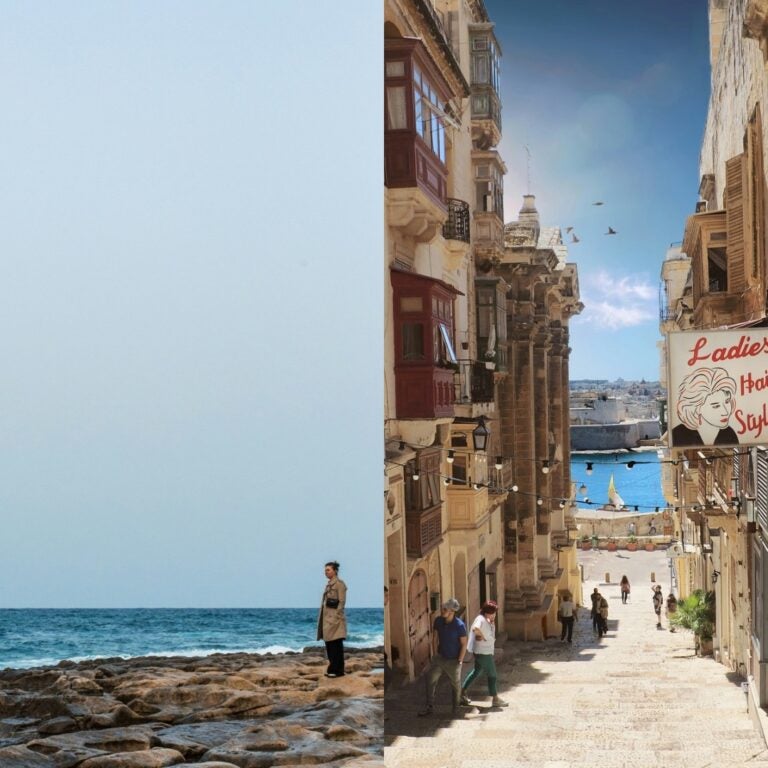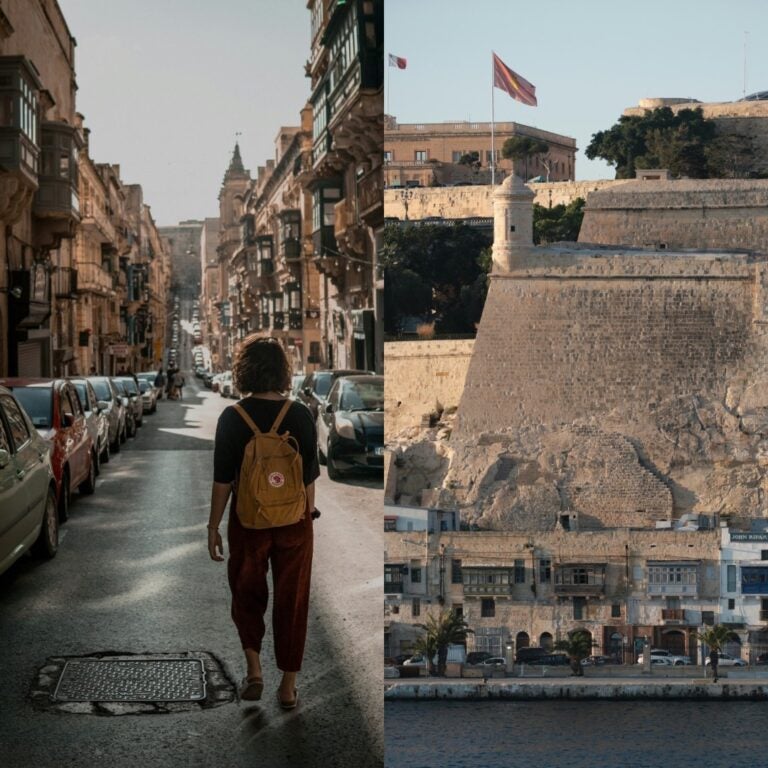Student visa for Malta: Requirements & process
In this guide, you will find information about the Malta student visa options and how to apply to study in this impressive country.
Malta’s strategic location, connecting Europe, the Middle East, and Africa, opens up a world of travel opportunities for students living there. It has become a popular academic destination for over 20,000 international students who choose Malta to learn English as a second language. In fact, Malta is globally recognized for offering English courses through more than 50 official schools. In this article, we’ll explain how to apply for a Malta student visa if you’re interested in learning a language or pursuing a more specialized course.
Malta also offers internationally recognized programs in technology, arts, and science, attracting students from Asia, Europe, and the Americas every year. Another benefit of studying in Malta is its unique learning environment, where European and Mediterranean traditions blend to create a warm and welcoming culture.
When do you need a visa to study in Malta?
Whether you need a visa to study in Malta depends on your nationality and the length of your studies.
- Students from the European Union (EU) and European Economic Area (EEA): They don’t need a visa to study in Malta; they only have to register with the local authorities if they plan to stay longer than 90 days.
- Students from outside the EU/EEA: A student visa is required if you plan to study in Malta for more than 90 days.
The student visa in Malta applies to different types of studies, such as:
- Long-term English courses.
- Bachelor’s, master’s, or doctoral programs at Maltese universities.
- Student exchange or academic mobility programs.
- Technical or vocational training courses lasting more than three months.
If the course lasts less than 90 days, some students may be able to enter on a tourist visa, depending on their nationality. However, for longer studies, it’s essential to apply for the proper student visa.
Types of visas for studying in Malta
National student visa in Malta
The national student visa for Malta is designed for non-EU/EEA individuals who plan to stay in the country for more than 90 days to study. It’s perfect for long-term language courses or university programs.
This visa allows students to legally reside in Malta for the duration of their course, as long as they’re enrolled in a recognized educational institution.
Schengen visa for short-term studies in Malta
The Schengen visa is an option for those planning to study in Malta for less than 90 days. It’s suitable for students enrolling in short English courses or brief educational programs.
This visa lets students explore other Schengen countries easily, making it ideal for those who want to mix studying with traveling around Europe.
Benefits of visas for studying in Malta
Having a student visa in Malta offers multiple benefits that go beyond access to education. Some of them are:
- Permit to reside legally in Malta: The student visa allows non-EU/EEA residents to live in the country legally for the entire duration of their course without any issues.
- Access to quality educational institutions: Malta is home to internationally recognized universities and institutes, as well as top-notch academies for learning English.
- Possibility of working: In some cases, students with a visa are allowed to work part-time during their studies, as long as they have the proper approval from local authorities.
- Opportunity to travel throughout Europe: With a Schengen or national visa, you can explore other Schengen countries in your free time, making your cultural experience even richer.
- Multicultural experience: As a top destination for international students, Malta provides a diverse environment and a great chance to build a global network.
- Access to public services: Visa-holding students have access to essential services like public transportation, healthcare, and support from their educational institutions.
Depending on the situation, certain permits let family or companions stay with the student in Malta, making it possible for many to enjoy their learning journey alongside loved ones.
National student visa in Malta: What is it for?
Malta’s national student visa is meant for those planning to study in the country for more than 90 days. It’s perfect for long-term language courses, university degrees, or technical training. Some of the benefits include:
- Legal residence during studies: It allows students to remain in Malta for the entire duration of the academic program.
- Access to formal education programs: Valid for accredited institutions such as universities, technical schools, and language academies.
- Possibility of working: Once you’ve completed your first three months of study, you might be eligible to work part-time (up to 20 hours a week), as long as you secure the proper permission.
- Visa renewal: If the course extends, the visa can be renewed without having to leave the country, allowing for continuity of studies.
- Opportunity to settle in Europe: Since Malta is part of the European Union, getting this visa can open doors to educational or career opportunities across other countries in the region.
- International cultural experience: Studying in a multicultural setting helps students develop key intercultural skills that are vital in today’s globalized world.
Schengen visa for short-term studies: What does it allow you to do in Malta?
The Schengen visa is suited for study programs under 90 days, making it ideal for quick language courses or focused, intensive training. Benefits include:
- Legal stay during short courses: It allows you to stay in Malta legally while taking a short academic course.
- Mobility within the Schengen area: Besides studying in Malta, the visa makes it easy to travel around the Schengen area, allowing you to mix your studies with some sightseeing.
- Great for intensive English courses: Many students choose Malta to learn English because of its high-quality education and the fact that English is an official language. This visa is ideal for those purposes.
- Easy access for frequent visitors: If you’ve held Schengen visas before, the application process might be quicker and easier.
Overall, the Schengen visa is a great choice for those pursuing short academic programs who also want to take advantage of traveling around Europe.

Requirements you must meet for each type of visa in Malta
Requirements to be eligible for the national student visa
To apply for Malta’s national student visa, you’ll need to meet some basic requirements. Here are the main ones:
- Acceptance at an educational institution: You’ll need an official acceptance letter from a recognized school, university, or academy in Malta.
- Course duration: Program must be longer than 90 days.
- Proof of financial resources: You’ll need to show that you have enough financial means to cover your tuition, accommodation, and living expenses while staying in Malta.
- International health insurance: Have valid health insurance that covers any medical emergencies during your stay.
- No criminal record: Provide a certificate of clean criminal record.
- Valid passport: Valid for at least six months after the expected end date of your studies.
- Commitment to full-time study: You’ll need to prove that you’ll be attending the course consistently.
Requirements for applying for a Schengen visa in Malta
If you intend to study for less than 90 days, the Schengen visa has specific requirements:
- Acceptance letter for a short course: You must submit a letter of enrollment or acceptance for an approved course in Malta.
- Proof of financial means: It’s important to show that you can cover your stay, including accommodation, food, and your return travel.
- Accommodation reservation: Hotel reservation, invitation letter, or proof of rental in Malta.
- Valid passport: Must have at least two blank pages and be valid for at least three months after the end of the stay.
- Schengen medical insurance: Insurance with a minimum coverage of $35,000 for medical emergencies.
- Round-trip tickets: You must show a flight reservation or proof of departure from the Schengen area.
Important: If you are a frequent traveler and want to stay connected without worrying about expensive roaming or looking for a new SIM at every destination, Holafly’s subscription plans are for you. With a single eSIM, enjoy internet in more than 170 countries for a fixed price and no surprises on your bill. Travel without limits and connect easily and securely! 🚀🌍

How to apply for a visa to study in Malta?
Documents you must submit to obtain a national student visa
To apply for a national student visa in Malta, you must submit the following documents:
- Visa application form: You can obtain this from your nearest Maltese embassy or consulate, or download it from the official website.
- Acceptance letter: Issued by the accredited educational institution.
- Valid passport: Make sure it has blank pages and is valid for the duration of your stay.
- Passport-size photograph: Complying with immigration authority regulations.
- Proof of financial resources: Recent bank statements proving your ability to cover expenses.
- International health insurance: Must be valid in Malta for the duration of your stay.
- Proof of tuition payment: Invoice or receipt showing that you have paid the course fees.
- Criminal record certificate: You must obtain this in your country of origin or current residence.
- Accommodation reservation: Letter confirming temporary or permanent accommodation.
You’ll need to submit your application at the nearest Maltese embassy or consulate and pay the processing fee there. Since approval can take several weeks, it’s best to start the process well in advance.
Documents you must submit to obtain a short-stay Schengen visa
If you wish to apply for a Schengen visa for short-term studies in Malta, these are the required documents:
- Schengen visa application form: You can download it online and fill it out with accurate information.
- Valid passport: With at least two blank pages and sufficient validity.
- Course acceptance letter: Issued by the academy or educational institution where you enrolled.
- Proof of accommodation: Hotel reservations, rental agreement, or invitation letter.
- Schengen medical insurance: With a minimum coverage of $35,000 for medical expenses.
- Round-trip airline tickets: You must show your dates of entry and exit from the Schengen area.
- Proof of financial resources: Bank statements, sponsorship letter, or proof of income.
- Recent passport-size photograph: In the appropriate format according to Schengen visa specifications.
You’ll hand in your documents at the embassy or consulate, where they’ll set up an interview and collect the visa fee. Typically, the visa gets approved within 15 to 20 working days.
Interviews and questions for applying for your student visa in Malta
As part of the student visa process for Malta, you’ll likely have an interview at the embassy or consulate. The goal is to make sure you meet the criteria and truly plan to study there.
Common questions during the interview:
- Why did you choose Malta to study? Answer by highlighting the quality of education, study programs, the language, and any other aspects that interest you.
- What course are you going to study and at which institution? Specify the name of the educational institution, the duration and the objectives of the course.
- How will you finance your stay in Malta? You must prove that you have sufficient funds or the support of a scholarship, family members or sponsors.
- What will you do once you finish your studies? Your answer should show your intention to return to your country or your future plans in line with your studies.
- Where will you stay during your time in Malta? Having a place to stay is important. This can be a student residence, a rental, or with family.
- Have you visited other countries or Malta before? They may ask you about your travel history and whether you have had previous immigration experiences.
It is essential to answer confidently and bring all documents that support your answers to avoid delays or problems during the process.

Where to apply for visas in Malta?
You can apply for a Maltese student visa in different ways, depending on the embassy or consulate in your country. Here are the most common options:
Online application:
- You can download and complete the official application form from the Malta Embassy website.
- Official website: https://identitymalta.com
- Once completed, you must send it along with the required documentation by email or through the designated system.
Malta embassy or consulate:
- You must schedule an appointment in advance to submit your documents and attend the interview.
- The embassy will review your application and keep your original documents until a decision is made.
- You can find the nearest Maltese embassy at: https://foreignaffairs.gov.mt.
Accredited agencies:
- Some education and migration agencies can handle the application process for you, making sure all forms and documents are properly completed before submission.
We recommend reviewing the specific deadlines and requirements of the Maltese embassy in your country, as they may vary depending on the region.
How much does a student visa for Malta cost?
The cost of a student visa for Malta can vary depending on the length of your stay and other application-related factors. Here’s a general breakdown:
- Student visa fee: A short-term student visa typically costs around $80-115, while long-term visas can range from about $115-140.
- Compulsory medical insurance: Both Maltese educational institutions and the government require international health insurance, which can cost anywhere from $170-580 per year, depending on the coverage.
- Administration and translation fees: If you need to translate documents or certify information, the cost can range from $60-235.
- Evaluation of academic documents: Some institutions require a process of evaluating previous studies, which can cost between $60-115.
In total, the visa application process and related expenses can cost between $350-820, not including tuition and living expenses.
How long does it take to obtain a visa to study in Malta?
The Malta student visa processing time can vary depending on factors like the time of year, the embassy handling your case, and how complex your application is. On average, here’s what you can expect:
- Preparation of documents and application: This step can take between 1 and 2 weeks if you have all the documentation ready.
- Review of the application: Once the documents have been submitted, the Maltese embassy usually takes between 15 and 30 business days to process the application.
- Visa delivery: If your application is approved, the visa can be delivered within an additional 5 to 10 business days.
We recommend starting the process at least 2 to 3 months before the start of the course to avoid any setbacks.
Lawyers to advise on visa procedures for studying in Malta
Chetcuti Cauchi Advocates
- Support: They offer specialized legal services in immigration and student visas for Malta.
- Location: Valletta, Malta.
- Contact: www.ccmalta.com
- Prices: Initial consultations from $115.
GVZH Advocates
- Support: Law firm with experience in immigration advice, student visas, and academic services.
- Location: Floriana, Malta.
- Contact: www.gvzh.com.mt
- Prices: Personalized services with competitive rates.
Frequently asked questions about visas for studying in Malta
We recommend starting the process at least 2 to 3 months before the start of the academic year.
Yes, all applicants for a student visa must have valid health insurance.
The duration of the visa will depend on the academic program, but it is usually valid for the duration of the course.
Yes, with a student visa you can work up to 20 hours per week.
You can review the reasons for rejection, correct any errors, and reapply.
Yes, you can renew it if you continue with additional studies or if your program is extended.





 Language
Language 


















 No results found
No results found



